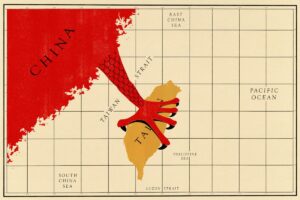Link to the earlier blog on the subject (China vs Taiwan)
Recently US Defence Department Spokesperson John Kirby made a statement on recent military exercises conducted by the Chinese People’s Liberation Army near the island of Taiwan. John Kirby told reporters that the US commitment to Taiwan is “rock solid” and that “the US is united with Taiwan against the current danger posed by the People’s Republic of China.”
Also the official Twitter accounts of the US State Department posted photos and tweets of Under Secretary of State José Fernandez and Assistant Secretary of State for East Asian and Pacific Affairs Daniel Kritenbrink respectively meeting with Taipei Economic and Cultural “Representative” Bi-khim Hsiao, claiming that the US commitment to Taiwan remains rock-solid, and the US will further strengthen ties with Taiwan. Media reports said that the US has invited Hsu Yen-pu, Taiwan’s “Army Commander,” to visit the US.
Strong Chinese Reaction
Zhao Lijian, spokesperson of the Chinese Foreign Ministry reacted strongly to these developments. Gist of his rebuttal is as follows:-
- Taiwan Island is China’s territory and the US is in no position to point fingers over the Taiwan question.
- US has been making negative moves to sell arms to Taiwan and strengthen official and military ties with the island, including a $750 million arms sale plan, the landing of US military aircraft on the island and frequent sailing of US warships across the Taiwan Straits. These provocative actions damage China-US relations and undermine regional peace and stability.
- The remarks by the US senior official seriously violate the one-China principle, sending an extremely wrong and irresponsible signal to the outside world.
- “Taiwan independence” is a dead end, and the Chinese mainland will take all necessary measures to resolutely crush any attempt at “Taiwan independence.”
- China’s resolve and will to safeguard national sovereignty and territorial integrity are firm and US should correct its mistakes and stop supporting secessionists in the island.
- The embassy warned the US not to fantasise about seeking China’s support and cooperation while wantonly challenging China’s red line on the Taiwan question.
Analytical Thoughts
- So far China and US are both shadow boxing over Taiwan issue.
- It seems both are testing the waters and each other’s resolve.
- It is like sumo wrestlers or boxers going round and round gauging each other, before engaging.
- Besides verbal duels, once in a while the two sides resort to strategic coercion and muscle flexing.
- The frequency of these acts is increasing.
- Final engagement and result would depend upon – who wins the power race and world number one position.
- Fate of Taiwan will determine the final result of the power race.
- India has a breathing space, so long as China is preoccupied with Taiwan.
- Our border dispute is still not resolved, with China claiming more and more.
- If it is able to unify Taiwan, it will get encouraged to try it elsewhere.
Doubtful Thoughts
China is determined to unify Taiwan with the mainland.
- Will China do it with its grey zone operations?
- Will China use force to achieve her objective?
- Will US fight for Taiwan?
- When is this shadow boxing likely to escalate into actual engagement with throwing of punches?
- Will the world get divided into two factions once again?
- Will India be able to maintain policy of equidistance or get drawn towards one of the factions?
Random Thought
Western powers have been ruling the roost for a while.
Coming century is of the Asia.
Question
What will be India’s role, position and choices in this scenario?
Suggestions and value additions are most welcome
Link to the earlier blog on the subject (China vs Taiwan)
For regular updates, please register here

